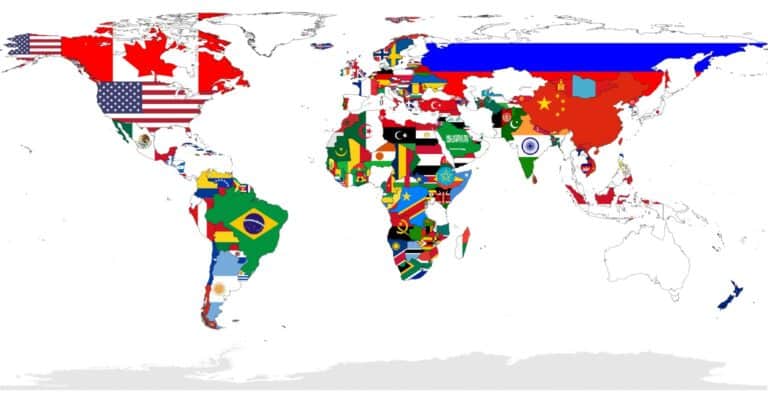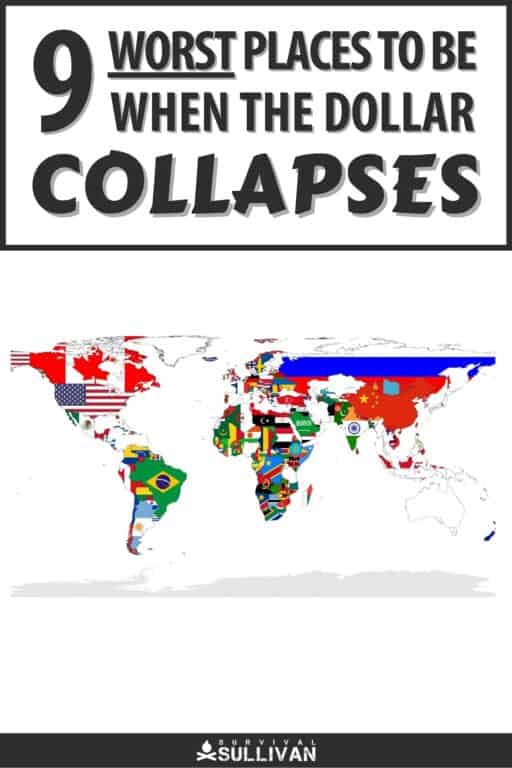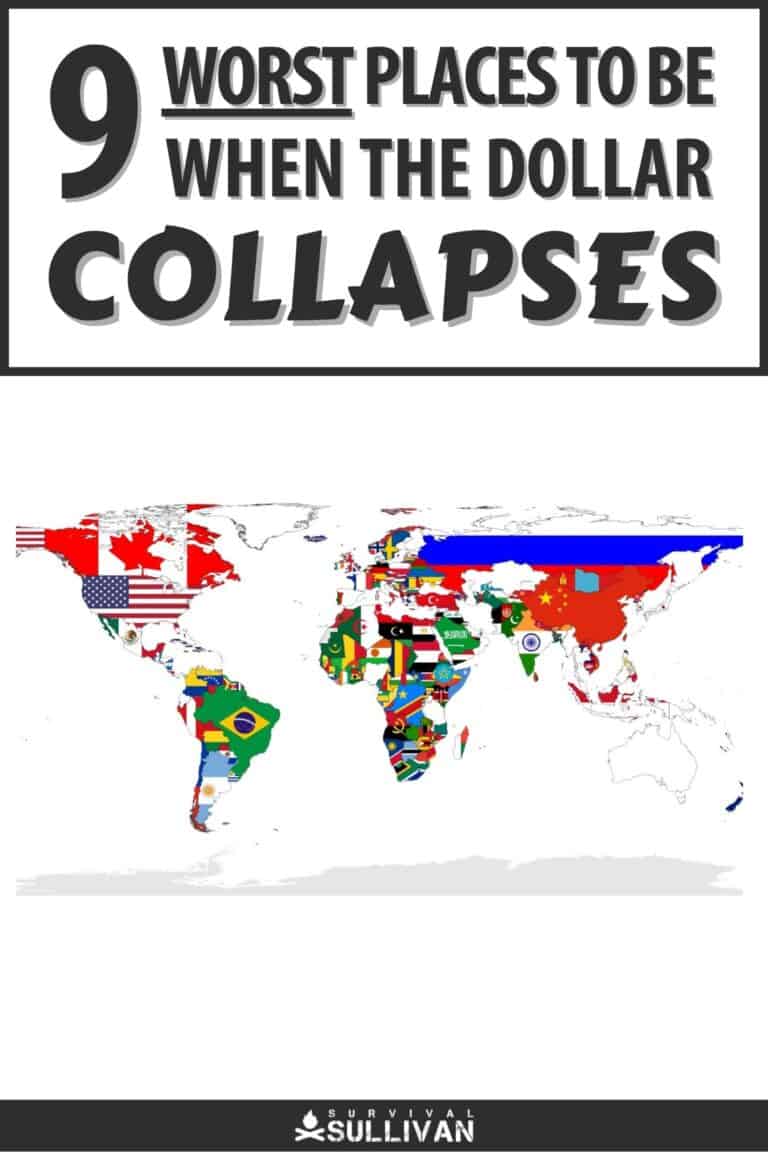While we think we have it tough, we actually have it pretty good. Store shelves are mostly full. Emergency services come when you call. The Government is around to keep it all generally in line. Even those in the direst straits rarely miss a meal.

In fact, the amount of government assistance is astronomical. Next, consider the amount of international aid the US makes available, and you have a significant portion of the world that is dependent on the US.
In short, if the dollar collapses, many places in the world will be dangerous at best, and apocalyptic at worst. Here are the top 9 worst.
World Reserve Currency
On the global stage, the US dollar is a huge deal. From being the world reserve currency to being the main means for purchasing oil, the Dollar is a significant part of the world’s economy.
As a result, countries around the world and their central banks have a constant need for US dollars.
Just as you keep stocks and mutual funds, world banks invest in the US currency. If your retirement account crashes, you’ll need to work past 65.
If the dollar crashes, the world banks have little recourse except to fail and to take their countries with them.
In 1974, Richard Nixon secured an agreement with Saudi Arabia and the other members of OPEC, where the common currency of oil was now the US dollar.
Wanted to purchase a few million barrels? Pay in dollars. Want to sell a few million barrels? You get US dollars.
In short, the US dollar financed almost every purchase and sale of oil. With each sale, the US gets a cut.
The result is that very few world transactions are completed without a little influence by the dollar.
Economic Collapse
If the dollar collapses, it will first take out local economies as the purchase and sale of goods will stop.
The result will be a panic run on banks and stores until a secondary currency system (barter, precious metals, etc.) can be established.
Second, the US Government will fail to meet its responsibilities to the individual states (e.g., in the form of aid) causing further issues as the states will fail to meet their obligations.
Finally, the US will fail to maintain its support of other nations. The US spends billions of dollars supporting and influencing other nations.
As that money dries up, portions of the world may fall into chaos as resources disappear and stability fail.
The resulting worldwide economic collapse and economic depression will ultimately be compared to the US depression of 1930 with one major difference. Back then, most of the world’s population was self-sufficient.
In the 30s, most of the US population was rural and one can assume, able to manage a portion of their own food supply and see to their basic needs.
Modern society is nowhere as independent, we are concentrated in urban centers, and we simply don’t have the perseverance as the generations past. The result has the potential to be apocalyptic.
1. California: Los Angeles, San Francisco
California, as a whole, has nurtured its dependent society. As the most populated state in the union, it contains the second largest city (Los Angeles) and the fourth most dense city (San Francisco). The result is a state that ranks 4th in total welfare spending.
California also has a gang problem with an estimated 450 gangs in Los Angeles alone. On a good day, the ability of the local, county, and state police to keep the gangs in check is stretched to its limit.
Finally, California has an active border that has led to millions of undocumented residents.
In all its generosity, California has taken on the burden of providing its undocumented population with free health care, governmental services, and education. This all adds up to a significant portion of the state’s aid spending.
The collapse of the dollar will shut off federal dollars to California and several cities that depend on aid for their very existence.
The legions in California that are dependent on aid and assistance will soon run out of food, medical needs, safe housing and will turn against each other to secure these needs.
2. Chicago
Chicago recently beat out Los Angeles for the greatest number of gangs within city limits. At over 8 violent crimes per 1,000 population and 2 murders per day in 2020, Chicago is violent during the best of times.
When the federal dollars dry up, not only will assistance end for the average citizen, but the federal aid will also affect the support systems such as the police, fire, and EMTs.
When 911 no longer answers the call and the police no longer respond, the criminal element won’t take long to notice and take advantage.
An already violent city will turn apocalyptic as those with power will seize what they need from those without the means of defense or the ability to escape.
3. New York City
The big apple will have big problems if the dollar collapses. Not the least of which is its geographic location and orientation.
The greater NYC area consists of Long Island, Staten Island, and Manhattan (also an island formed by the Harlem River). NYC is essentially cut off by geography.
The result is approximately 18 million people that will be cut off from their source of food, water, and medical supplies.
They say that we are 9 missed meals from anarchy. If this proves true in NYC, then the priority will be to escape the island to safer ground.
The bridges connecting NYC to the rest of New York and New Jersey have a limited capacity and, as we saw on 9/11, they will quickly become unusable to vehicle traffic and the masses will have to walk to escape the chaos that will soon envelop the city.
But where will they go? The suburbs surrounding NYC are already near capacity and require outside assistance to survive (e.g. food, medicine, and other supplies shipped to grocery stores, pharmacies, and hospitals).
The mass exodus from NYC will only make a bad situation in the suburbs even worse.
4. Washington DC
The seat of democracy in the United States is not immune to the ills of society. Washington DC has double the violent crime rate and double the property crime rate of the national average.
It has almost 20 times the crimes per square mile (498) vs. the national average (26) and 16% of the population is below the poverty line.
Over 7 million people live in the nation’s capital. A large number live only temporarily in DC as they are representatives and support staff from other places in the US, including military or supporting contractors.
A sudden collapse will cause all the normal chaos experienced by every other densely populated area.
The primary difference will be that in DC there will be an urgency to leave, to go home.
Couple this with the observable exodus and overt protection of the privileged classes, the social divide will become untenable, and chaos will be inescapable.
5. Louisiana
The fine line between survival and disorder is that we met basic needs. More and more members of society depend on governmental assistance.
Be it for food, shelter, or medical care, a segment of society requires assistance to meet these requirements for a comfortable life.
Louisiana receives more federal assistance per capita than any other state in the union. Almost 20% of the population lives below the poverty line.
In America, it is possible for the poor to find a meal relatively easily. Be it government food stamps or charitable giving (sometimes called soup kitchens) a meal is usually only a short walk or a few miles away.
When the government coffers dry up, the poor will be impacted early and will be the first to seek food from any resource possible. And in Louisiana, the assistance will run out quickly.
The desperation will affect every corner of Louisiana. Need proof, look at the pace at which New Orleans fell after Katrina.
6. West Virginia
West Virginia has a host of issues that will be impacted by the collapse of the dollar. West Virginia is just behind Louisiana, ranked #2 in the number of citizens (per capita) that receive federal assistance.
Complicating this issue is West Virginia’s drug problem. West Virginia is #1 in drug overdoses and deaths per capita in the country. The dependence on drugs will only accelerate the downfall of the state.
When the dollar collapses, addicts will have to search out other means for paying for their next fix.
Unfortunately, this will spread and affect both rural and urban areas, compounding the other issues already discussed with other cities and states.
7. London
The United States won’t be alone in the negative effects of the dollar’s collapse. As has been said many times before, when the US gets a cold, the world gets the flu. London will not escape the effects of the downfall of the dollar.
London is home to over 9 million people. As one of the most visited cities in the world, it is home to an incredible mix of Londoners and foreigners alike. Many are refugees or have come to live and work in London.
When times get tough, London will most likely fracture into many, many factions enforced by cultural differences.
8. Middle East and Israel
One of the few democracies in the middle east, Israel, is threatened by its neighbors on a good day.
Often times the United States urges Israel to keep a steady hand when international affairs heat up and kinetic action seems to be on the horizon. Likewise, the pledge of assistance keeps otherwise hostile neighbors at bay.
If the US dollar fails, then much of its aid to both Israel and its neighbors will fade. As a result, the US’s ability to influence the region into peace will disappear.
It won’t take long for the feudal nature of most countries in the region to re-assert itself causing internal chaos as well as outward acts of aggression.
9. Africa: Ethiopia, Nigeria, Sudan
Many African nation rely on the United States, their allies, and associated Non-Governmental Agencies (NGOs) for critical levels of aid.
Of these, Ethiopia, Nigeria, and Sudan received a total of 3.7 billion dollars of US aid from various programs.
The crisis in these nations ranges from food insecurity to political and social upheaval.
The US aid brings much needed food assistance, humanitarian assistance, and consultation services on everything from faith-based services to small business operations.
The failure of the US dollar will have a profound impact, starting at the top and political stability down to the very last person receiving nutritional supplements. The chaos that may ensue will touch every corner of these countries.
Escaping The Collapse Of The Dollar
There are very few activities in our daily lives that aren’t impacted by the strength of the US dollar.
The bounty of our stores, the stability of our infrastructure, to the safety and security provided by our police, fire, and emergency medical services.
The crumbling of our financial foundation will cause instability at all levels of life. Stores will be empty, 911 will stop answering, and the police and firemen will stay home to protect their own.
All is not lost. There will be a few ways to preserve your wealth and your life.
First, as the signs of collapse become obvious, start moving your (soon to be worthless) cash into tangibles.
Anything you can barter with will become valuable as others fail to stock up. Food, water filters, hygiene items, and medicines all top the list.
Next, move cash into precious metals. Gold and silver have held value since biblical times. While they may not be immediately tradeable and valuable, history proves that, in the long run, precious metals have always been valued.
Finally, be prepared to move. The right rural area may be isolated from the worst of the damage and a self-sufficient homestead (or bug out location) can be a refuge from the trials and tribulations of more populated areas.
If in doubt leave the US. There are many locations around the world where a modest amount of wealth can provide a subsistence level of living for a long time.

A little money spent on food and protection can lead to a secure life if not a comfortable one in the right place.

The post Worst Places To Be When The Dollar Collapses. Here are The Top 9 appeared first on Survival Sullivan.
By: Tom Marlowe
Title: Worst Places To Be When The Dollar Collapses. Here are The Top 9
Sourced From: www.survivalsullivan.com/worst-places-when-dollar-collapses/
Published Date: Fri, 07 Apr 2023 16:00:00 +0000
-------------------------------------------------------------------------
 CampingSurvivalistHuntingFishingExploringHikingPrivacy PolicyTerms And Conditions
CampingSurvivalistHuntingFishingExploringHikingPrivacy PolicyTerms And Conditions
